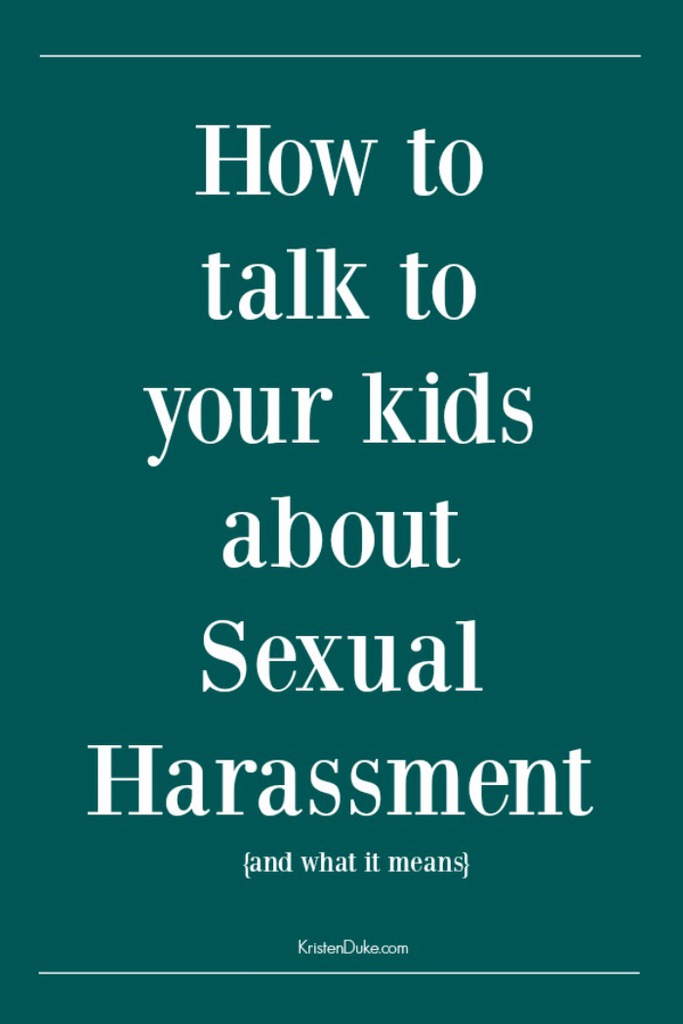I wanted to share my thoughts on How to Talk to your kids about Sexual Harassment because it’s clearly an epidemic in our society. Just my thoughts, nothing scientific. It goes hand in hand with the talking to your kids about pornography post I just published.

As I’ve scrolled through my Facebook feed the past few days, and seen countless friends chime in with the status #metoo in regards to having had an encounter in their life with sexual harassment, I’ve had a wide range of emotions.
Suprise
Heartache
Anger
Shock
Admiration
Guilty
For the lack of a better term, I’ve felt a bit of survivors guilt, as I can honestly say I’ve never experienced sexual harassment in my life. Maybe I have and don’t remember it? But nothing that sticks out to me in my memory banks. I’ve mentioned before, but I recognize, I’ve lived a charmed life, oblivious for many years that there was much sorrow outside of the happy bubble I grew up in. I’m so grateful for all of that, and I always will be, but it doesn’t cease to surprise me over the years to find that many people in my life have been affected by some sort of abuse, great and seemingly small.
These encounters have a lot to do with the self esteem we grow. If someone experiences abuse as a child (boy or girl) they grow up being negatively affected by it. Confidence is often lowered. It affects how they see the world, and can even produce anxiety and depression. The world is challenging enough, what is wrong with people?
My heart breaks.
But I am a HUGE advocate that as we share pain with the world (or just those close to us) that we are able to a) let it go a little easier b) help others to know they are less alone
I believe in the power of community. In empathy. In being an emotional support for each other. That by sharing, we are able to let go a little bit more of the pain, as that confidante takes it on in a small way.
BUT, it’s not always easy to share something so painful.
Some in society place stigmas, so it makes the situation more fearful to speak out about.
Unfortunately, victims feel shame, embarrassment, confusion, and often keep silent.
Shame comes from isolation, so the more we can open up and talk about it, the less shameful…guilty…alone….one might feel.
How is this world so cruel, and how was I able to avoid all of that?
Someone shared a video from none other than Punky Brewster that really got me thinking. Her message was about raising her boys, and I like it a lot. Click the link to watch it.
I wanted to share my thoughts on starting the conversation with your children, and what specifically we can say to the boys vs. the girls.
A big problem plaguing our youth is the entitlement trap. Entitled to think they can have whatever they want, because they want it. No real consequences, sometimes a slap on the wrist. These youth are growing up to think they can do the same thing in regards to how they treat others. Just whatever they feel at that given moment.
What exactly is Sexual Harassment?
Kids may not really know. Cover all your bases in your conversations with them:
- Verbal (jokes, rumors, comments)
- Cyber (social media)
- Physical (unwanted touching)
- Nonverbal (gestures/inappropriate notes)
- Unwanted behavior (stalking)
How to Talk to your kids about Sexual Harassment
- To the boys: What you see on TV and in movies is not reality. Pornography teaches unrealistic expectations of how relationships work, and sends confusing messages. The interactions between men and women are not real on TV, don’t believe it. You should treat all women like you would treat your own mother. Women are not objects, they have feelings. Do not ask for inappropriate pictures from girls.
- To the girls: No one is allowed to treat you less than. Even if it was “just a joke” but you felt uncomfortable, say something. Stand up for yourself. Tell someone. Stop something at the beginning, not when it gets bad. No one is entitled to violate you in any way, and they need to know it. Stick up for each other if you see boys being inappropriate to a friend. You want a man who loves you for your mind and your heart, not your body. Walk away if they don’t. It doesn’t matter if your friend says it’s no big deal, if you think it is, go with your gut. I know some will disagree with this, but girls: what you wear and how your present yourself (for better or for worse) makes a statement. Dressing modestly attracts a lot less attention to the body (though doesn’t necessarily prevent all incidents).
- To both genders: No one is allowed to touch you without your consent. Period. If you don’t feel like hugging your parents, you don’t need to be forced to. The same goes for others as well. Be respectful.
- To the parents: Ask specific questions and lots of questions. They might not recognize that what they are doing is wrong, but the more open communication you have, the more you can better understand them and guide them. Men, talk to your girls. Women, talk to your girls. They need to hear both perspectives. Share a personal example of when you did speak up, or should have spoken up. Or made a mistake, and learned from it.
This may have been more of a jumbled brain purge than helpful for anyone, but most importantly parents…TALK TO YOUR KIDS! They might not like it, but if you’re driving in the car, on the way to ice cream or dinner or shopping, they are likely to be more open. If your kids don’t talk, ask their friends. I often get more details about life out of my kids friends than them sometimes. Men, talk to your boys. Women, talk to your boys. They need to hear both perspectives.





